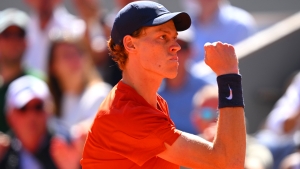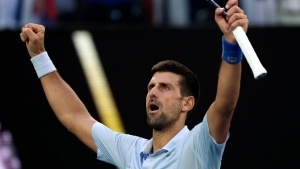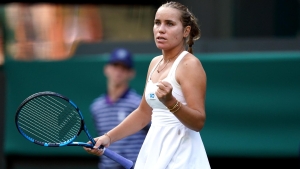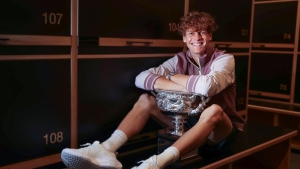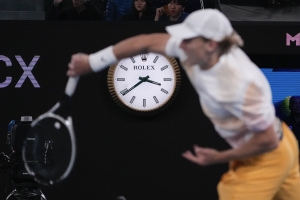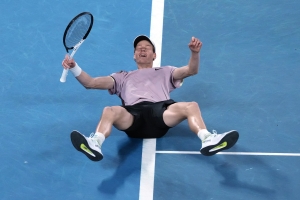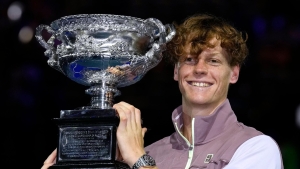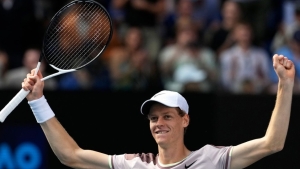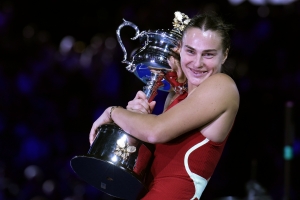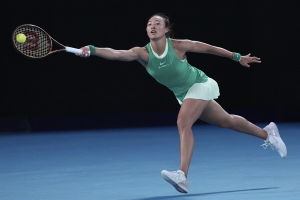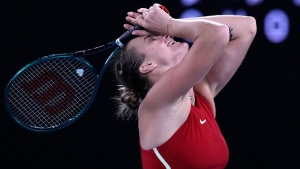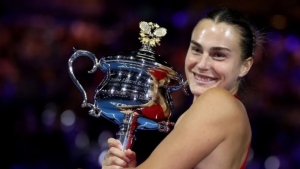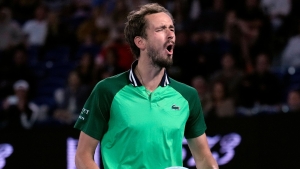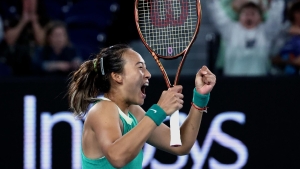Jannik Sinner proved himself a man for the big occasion with a stunning comeback against Daniil Medvedev to lift his first grand slam trophy at the Australian Open.
The 22-year-old Italian handed Novak Djokovic his first loss at Melbourne Park for six years in the semi-finals but looked like he would have to settle for the runners-up plate as Medvedev dominated the first half of the match.
Sinner was not finished, though, and he slowly began to take control with his huge groundstrokes, opening his grand slam account in brilliant fashion with a 3-6 3-6 6-4 6-4 6-3 victory.
Earmarked as the man most likely to lead the game into its next era alongside Carlos Alcaraz, Sinner, who beat three of the top five seeds in successive matches, has decisively shown that he can be a force for years to come.
He is the first Italian to win the singles title in Melbourne and the first man at any grand slam since Adriano Panatta at the French Open in 1976.
“It means a lot, maybe the most important thing,” said Sinner, who led Italy to the Davis Cup title in November.
“There is always pressure, but the pressure is something good. I like to dance in the pressure storm. Because that’s where most of the time I bring out my best tennis.
“I still have to process it because, beating Novak in the semis and then today Daniil in the final, they are tough players to beat.
“So it’s a great moment for me and my team but, in the other way, we also know that we have to improve if we want to have another chance to hold a big trophy again.”
Sinner is the youngest winner of the men’s title since since Djokovic back in 2008, but he is mature beyond his years on and off the court.
In his acceptance speech, Sinner, who was a champion skier as a child, movingly thanked his parents for allowing him to choose his own path.
“I don’t see them so often, unfortunately, but when I see them it’s always a great time,” he said with a smile in his press conference.
“I went away from home when I was 14 years old. So I had to grow up quite fast, trying to cook for myself, trying to make laundry.
“I think for me it was tough but, for my parents, to leave their son at 14 years old, it’s also not easy. They never put pressure on myself, which for me is maybe the key why I’m here today. I’m a quite relaxed man, who just enjoys to play tennis.”
It had been almost 20 years since an Australian Open final did not feature one of Djokovic, Rafael Nadal or Roger Federer.
Medvedev had the benefit of experience playing in his sixth grand slam final, while for the first time he did not see either Djokovic or Nadal across the other side of the net.
The Russian had endured a tortuous route to the final, though, with three five-set matches, two of them from two sets down, and more than 20 hours spent on court.
His solution was to go against type and begin in ultra aggressive fashion, which brought immediate dividends with an early break of the Sinner serve.
The Italian had not faced a single break point against Djokovic but here he could not keep Medvedev at bay, the third seed, who won his only slam title so far at the US Open in 2021, opening up a 5-1 lead in the second set.
Sinner retrieved one of the breaks and, although he could not quite turn the set around, it was a sign of things to come and, as Medvedev tired, the young Italian began to get on the front foot, breaking in the 10th game of both the third and fourth sets.
Heading into the decider he was a clear favourite once more and, after breaking to lead 4-2, he sealed his big moment in fitting fashion with a forehand winner blasted down the line.
Sinner admitted Medvedev had taken him by surprise with his approach, saying: “I was expecting something different from his side, so I had this feeling that he might come out a little bit more aggressive. Not this aggressive.
It was a cruel way to lose for Medvedev, who was also beaten from two sets up by Nadal in the final two years ago and was hoping to make it third time lucky in Melbourne.
But the 27-year-old refused to be too downhearted, saying: “I was trying to be proud of myself, and I am. I was fighting, I was running. I was, like, ‘If tomorrow I don’t feel my legs, it doesn’t matter, I’m going to try everything I can today until the last point’, and I did it.”
No one has ever spent longer on court at a grand slam, to which Medvedev reacted with a wry smile: “At least I got a record in something.”























